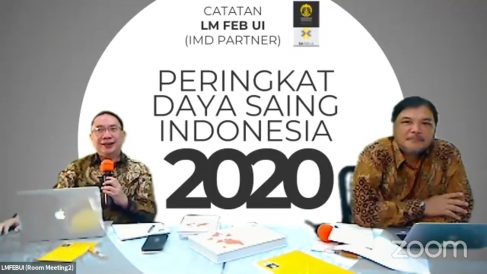LM FEB UI Announces Indonesia’s Competitiveness 2020
Nino Eka Putra ~ FEB UI Public Relations Officer
DEPOK, (16/7/2020) – Switzerland-based International Institute for Management Development (IMD) has released global competitiveness reports for more than 30 years. The reports are compiled using hard data, business surveys, and data backgrounds. The data are collected in collaboration with partners in the countries where the study is conducted, including the Management Institute at the Faculty of Economics and Business, Universitas Indonesia (LM FEB UI), its partner in Indonesia.
This year, IMD’s World Competitiveness Rankings measured the competitiveness of 63 countries to determine how they manage their competence to achieve long-term economic growth, create job opportunity and ensure the welfare of their citizens. Competitivenes is measured based on four factors, namely economic performance, government efficiency, business efficiency, and infrastructure.
On Thursday (16/7/2020), LM FEB UI as IMD’s partner in Indonesia announced through Zoom and YouTube the results of the measurement of “Indonesia’s Competitiveness Ranking 2020”. Speakers at the event were Dr. Toto Pranoto, Senior Advisor at LM FEB UI, and Dr. Willem Makaliwe, Head of LM FEB UI, with Bayuadi Wibowo, S.T., M.T., Head of the Research Division of LM FEB UI, as moderator.
Toto Pranoto said that LM FEB UI has collaborated with IMD for three years to measure Indonesia’s competitiveness as part of the annual World Competitiveness Ranking report.

Indonesia ranked 40th out of the 63 countries measured in IMD’s World Competitiveness Ranking for 2020, down from the 32nd position last year. When compared to other ASEAN countries, Indonesia is below Singapore, Malaysia, and Thailand. However, Indonesia is still in a better position than the Philippines, which ranked 45th out of 63 countries.
In Asia-Pacific, Indonesia ranked 11th out of 14 countries measured. In terms of economic performance, Indonesia ranked 26th this year, down slightly from 25th in 2019.
“This year, Indonesia’s performance declined across four key factors measured, namely economic performance, government efficiency, business efficiency, and infrastructure,” said Toto.
Toto went on to say that Indonesia’s government efficiency ranking declined from 25th in 2019 to 31st in 2020. Infrastructure ranking also dropped from 53rd in 2019 to 55th in 2020. Business efficiency suffered the worst decline, from 20th position in 2019 to 31st in 2020.
The above measurement, when viewed from factor and sub-factor rankings, can be further broken down into the following: First, employment as a sub-factor of economic performance scored the highest, at number 11, and international trade the lowest, at number 50. Second, tax policy as a sub-factor of government efficiency was ranked at number 6, and business legislation scored the lowest, at number 50. Third, basic infrastructure as a sub-factor of infrastructure was ranked 42nd and health and the environment scored the lowest, at number 58. Fourth, the labor market as a sub-factor of business efficiency was ranked at number 4 and productivity and efficiency scored the lowest, at number 47.
Willem Makaliwe, the second speaker, added that one of the indicators of Indonesia’s declining competitiveness was the small and medium enterprises (micro businesses) that have been affected by the Covid-19 pandemic. They have gone out of business, driving unemployment up. Thus, the government should support and assist micro-businesses because the rankings of the sub-factors of business efficiency and infrastructure technology are low, at number 53 out of 63 countries.

Another indicator, export, which is still low, was ranked at number 58. This is not due to the pandemic but because of dependence on China. Meanwhile, business efficiency declined and labor productivity as one of its sub-factors was ranked at number 44 and banking capacity at number 58.
“Infrastructure competitiveness also needs to be improved, especially with regard to health, communication and copyright. “Aspects that are a source of strength of the components of economic performance are the growth of Gross Domestic Product, the stability of fuel prices, and the growth of investment,” said Willem. Factors that contribute to the strength of government efficiency include tax revenue and increased social security. Assessment of infrastructure components that are its strength are the cost of cellular telecommunications and the ratio of new and renewable energy utilization.
“The challenges Indonesia must address in 2020 are the economic slowdown in the first semester, recovery method, a spike in unemployment and poverty rates due to economic uncertainty, declining export/import activities due to lower global demand/supply, unclear government strategies to support small and medium enterprises (SMEs) due to a lack of data mapping of SMEs, and the potential for a financial crisis caused by an increase in bad credit, “said Willem by way of ending his session. (hjtp)
(lem)





